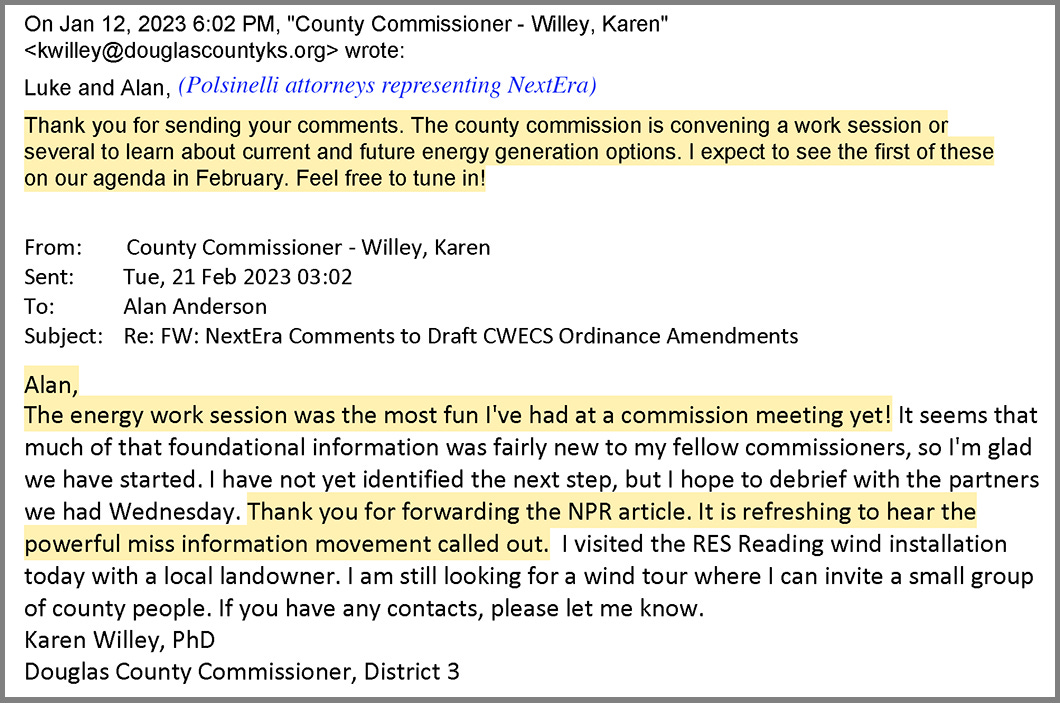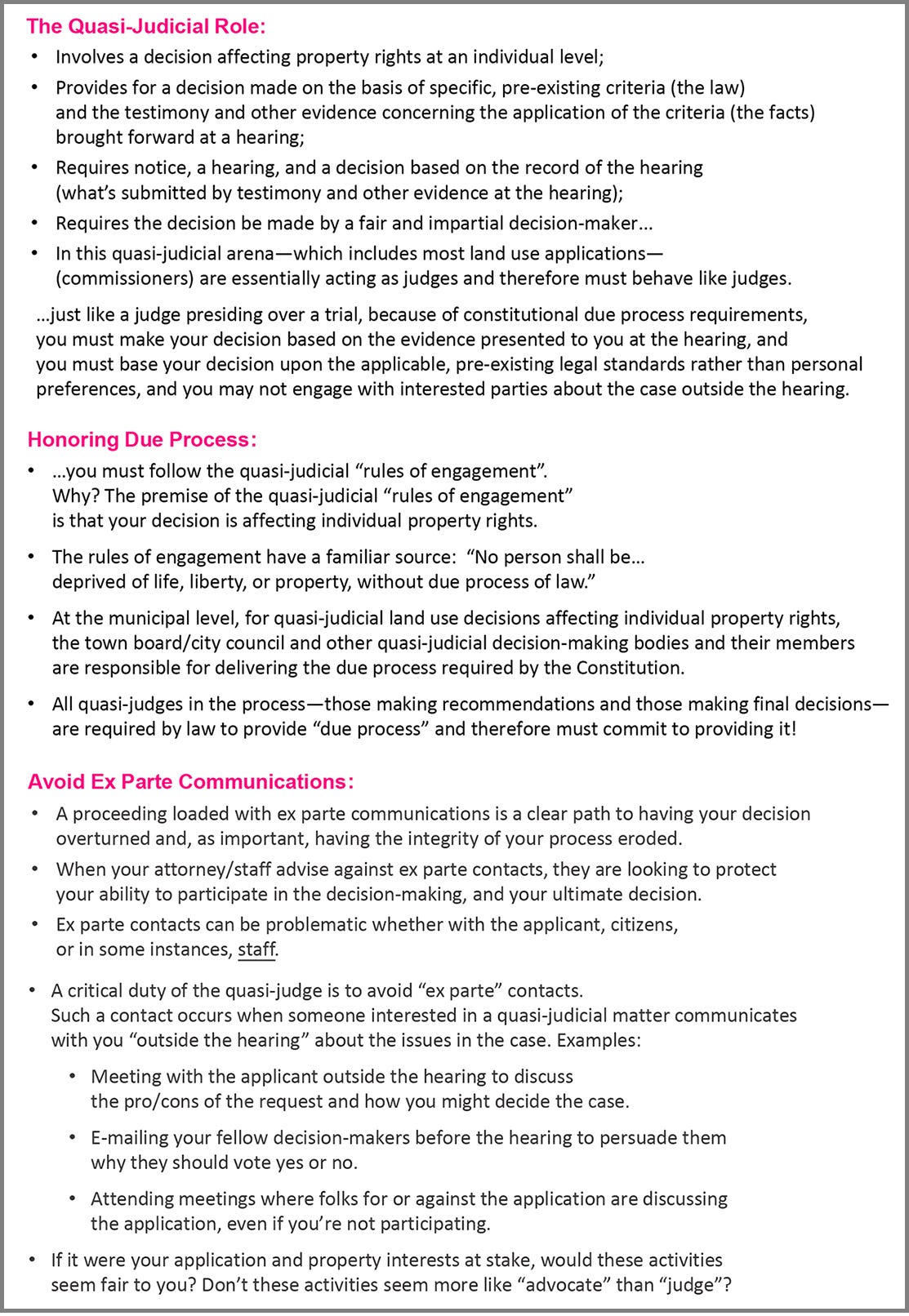Commissioner bias and bad faith behavior casts a long shadow on county government
(series: What's the matter with Douglas County, Kansas?)
A pending lawsuit against Douglas County (and related Open Records results) reveals troubling behavior behind the scenes of local government.
Earlier this year, alleged improprieties came to light after a whistleblower shared evidence of County Commissioner Karen Willey’s backroom efforts to facilitate the permit application for the Savion/Evergy industrial-scale solar installation Kansas Sky, a project that I support (with some new caveats).
Before we delve into the commissioner’s specific activities, it’s important to clarify that a county commissioner has two fundamental functions.
One is legislative, such as the evaluation and approval of land-use regulations. The other is quasi-judicial – that is, when a permit application comes before them, they must approve/deny/revise/remand the permit based on:
the evidence presented at the hearing and in the application;
compliance with the county’s established regulations and policies
(such as exemplified in a Comprehensive Plan);and applicable statutes and related precedents like “Golden v. City of Overland Park” and “Combined Investment v. Board of Butler County Commissioners”.
Essentially, a commissioner serves as a kind of judge. And judges are not supposed to be overtly advocating for a particular party or outcome because the Constitutional right to due process means, among other things, the public and/or opposing parties have a right to participate in the government proceedings. Above all, they have a right to unbiased decision-makers.
I think it’s safe to say that a county official – especially acting in a quasi-judicial capacity – should not be seeking out a permit applicant before a hearing to suggest ways to get their project approved. A commissioner shouldn’t organize teams of county administrative staff to enact their own ideological wishlists for a specific type of permit, or broker relationships between an applicant and cherry-picked organizations and individuals (especially not a co-worker or their spouse’s employer), or imply there’s a required financial investment for the commissioner’s handcrafted “improvements” to ensure a permit gets approved.
But the lawsuit, filed by a group of Grant Township residents against Douglas County suggests just that.
The following is a timeline of Commissioner Willey's ex parte activities, as documented in Docket DG-2024-CV-000153 (compared to her ex parte disclosures at the Douglas County BOCC Savion/Evergy permit application hearing on April 13, 2024).
Nov. 2023: In the fall of 2023, (before the Dec. 18 Planning Commission hearing on the Savion/Evergy Kansas Sky solar project) Commissioner Willey assembled an application-boosting team she referred to as her “crew”: County Planner Mary Miller (lead staff member working on the Savion/Evergy permit application); Kim Criner Ritchie, the county’s sustainability manager; Amber (Dunn) Thumann, Willey’s co-worker at the consulting agency Futureful LLC; and Kelly Kindscher, a KU environmental studies professor with the Kansas Biological Survey, a Kansas Land Trust board member, and advisor to Kansas branch of The Nature Conservancy; and County Administrator Sarah Plinsky. By this time, Willey had already asked Thumann to develop an agrivoltaics plan for the Savion/Evergy solar project.
EX PARTE DISCLOSURE: “I communicated with Ashton Martin with Savion and Kelly Kindscher regarding agrivoltaics… I encouraged Ashton to utilize local experts including the (Kansas) Biological Survey and the county’s sustainability office.”
Nov. 29, 2023: Thumann sent a preliminary agrivoltaics plan to Willey’s private email, stating: “I would also like to propose that the long term management of the farming operation be embedded in DG county's sustainability office, funded by Evergy. I am happy to sign on as a consultant to set everything up, develop the operating agreement, create the partnerships and get this running (3 to 4 year contract I think)... I have no preference on whether Evergy pays me or the county with Evergy's money.”
EX PARTE DISCLOSURE: “I reached out to Amber Thumann, permaculture lecturer at KU and K-State and board member of the Kansas Permaculture Institute and co-author of a DOE research grant letter of intent with KU to study agrivoltaics that was not funded, as it turns out…” This is a world-class execution of circumlocution: Willey says a lot of words but fails to mention that she and Thumann work together at Futureful LLC…
On Nov. 30, 2023: met with County Administrator Sarah Plinsky, County Sustainability Manager Kim Criner Ritchie, and Amber Thumann (Willey’s co-worker) for a “what if conversation about agrivoltaics… No specifics of that conversation were shared with any applicant.”Dec. 1, 2023: Commissioner Willey texted Savion’s Senior Permitting and Environmental Manager, Ashton Martin, and asked him to call her.
Dec. 3, 2023: Willey texted Tyler Lindquist, chair of the Douglas County Food Policy Council to rally support for the project; she wrote: “…what else would we need to see in the Savion plan to be supportive?”
EX PARTE DISCLOSURE: On Dec. 4, 2023 “I had a phone call with Tyler Lindquist…
he expressed hope for solar with agriculture.”Dec. 5, 2023: Willey and members of her “crew” met with Savion’s Ashton Martin, who also brought attorney Matthew Gough. The commissioner told the Savion representatives that she thought their “weak” agrivoltaics plan may jeopardize their permit application; she then proceeded to offer to revise the application and recommended that Savion hire her co-worker (Thumann) to rewrite the agrivoltaics plan. (Willey already had Thumann’s draft of the revised agrivoltaics plan in hand, it had been sent to her personal email a week earlier.) She also told Savion that they needed to incorporate the “Four Point Plan” she had developed, which included committing substantial funds for agrivoltaics, acquiring additional acres for agrivoltaics, hiring a third-party agrivoltaics manager, and working with “local partners to advance agrivoltaics”.
In actuality, Willey may have been communicating her wishlist to Savion staff as far back as March 8, 2023, as indicated by a text from a Savion agrivoltaics consultant: “Yes! I do think Savion has heard your 4 points. Way to go. (happy face)”
Following the Dec. 5 meeting:
• Savion allocated $100,000 to fund Willey’s agrivoltaics ambitions.
• A county employee approached County Administrator Sarah Plinsky about the propriety of a commissioner’s self-appointed championing of the Savion permit application... Plinsky informed Willey of the staff “whistle-blower” and instructed her to “stop meeting with Savion/Evergy and contact the County Counselor”.
• Willey texted her “crew” to tell them, “count me in for whatever is helpful!”EX PARTE DISCLOSURE: Met with Savion/Evergy personnel, Amber Thumann (Futureful LLC colleague), Kelly Kindscher (Kansas Biological Survey/Kansas Land Trust), and county staff members Kim Criner Ritchie and Tonya Voigt at the 13-acre Stull Solar site on Dec. 5, 2023.
Dec. 12, 2023: Willey texted Tyler Lindquist, chair of the Douglas County Food Policy Council, soliciting a letter of support because “pressure to deliver
on agrivoltaics is a help from any source”.That same day, Willey reached out to Amber Thumann about finding a third-party agrivoltaics manager “that she personally trusted”. She also emailed The (Kansas) Nature Conservancy requesting help to “stand up a new program… What I am looking for in a lead organization is stability and mutual trust… if there is a chance that TNC might consider such a role here, I would be delighted to talk further.” TNC replied that they were “very interested in being the lead organization on the agrivoltaics program” and asked about any “upfront considerations from the county’s perspective.” (Significantly, Willey’s husband, Scott Eudaly, was working for The Nature Conservancy from Oct. 8, 2023 to March 6, 2024.)
EX PARTE DISCLOSURE: (Regarding the Dec. 12 communication with The Nature Conservancy) “I mentioned we should have included in the solar regulations a requirement that a third party oversee any agrivoltaics program; I was surprised to learn they were interested and had already been contacted by Savion/Evergy.”
Dec. 14, 2023: Willey emailed County Administrator Sarah Plinsky, Sustainability Manager Kim Criner Ritchie, and Zoning Director Tonya Voigt: “The Nature Conservancy is interested in being a third-party contractor for an agrivoltaics plan… Are there other partners to pursue or run with TNC for now?”
(Dec. 14, 2023 coffee date with NextEra’s Kansas/Nebraska solar project manager.)
Dec. 18, 2023: Willey sent information about a possible agrivoltaics grant to
The Nature Conservancy, stating it could “greatly ease startup costs for an agrivoltaics program capital needs. When can your staff and mine meet to talk over possibilities?”Dec. 21, 2023: The Nature Conservancy emailed Willey, “We are working through some internal due process so we can engage on a regulated issue. Attached is the rough concept that we are using for that process. Would you be able to review it and let us know if we are on the right track with what we had previously discussed?”
Jan. 5, 2024: Commissioner Willey and County Administrator Sarah Plinsky met with The Nature Conservancy representatives via Zoom. After the meeting, Willey sent an email “Re: Agrovoltaics program” to Ben Postlethwait, Director of The (Kansas) Nature Conservancy and Justin Cobb, TNC Government Relations Manager, and county staff, Sarah Plinsky, Kim Criner Ritchie, and Tonya Voigt where she again laid out her agrivoltaics edicts, calling for “a trusted third-party – not county or energy company – gatekeeper” and stated “[a]n investment in infrastructure available to producers would be key. For example, a climate-controlled workspace with restrooms, classroom, wash-pack, and cold storage facilities would be ideal in order to serve small producers and on-site education; livestock working and loading facilities would aid grazers.” She also designated County Administrator Sarah Plinsky to function as a proxy, i.e. “a great first point of contact for questions of county staff or commissioners”.
(March 12, 2024 – interview on KLWN radio: Willey said she was hearing “from the community” that the agrivoltaics requirements weren’t vigorous enough – so she had come up with four principles: a third-party gatekeeper, collaboration with local experts, no cap on acreage for agrivoltaics, and a “reasonable” financial commitment from the developer.)
March 27, 2024: At a public meeting Willey rhetorically asked is “$100,000 enough for agrivoltaics?”
Savion later increased the funding to $250,000 for “agrivoltaics research”.
Prejudice: ex parte efforts and financial incentives
Ex parte communication is communication between an official and a member of the public that takes place outside of a designated proceeding. This type of interaction is generally discouraged, but when it does occur, the official is supposed to disclose it at the hearing, share the information exchanged, and acknowledge the degree of influence. If the public or other opposing parties are unaware of these clandestine communications, they are, essentially, denied the right to access the pertinent information and to participate in a meaningful manner.
So, what does it mean when it is the county commissioner who is actually the one initiating and encouraging the ex parte activity?
It is troubling – and indicates a significant degree of bias – that a commissioner was expending such an extraordinary amount of effort in service of a particular type of permit application.
Compounding this is the “compensatory bias”.
Not only was Commissioner Willey surreptitiously seeking (and receiving) a financial commitment for agrivoltaics, she was also fully aware of the “Payment In Lieu of Taxes” or PILOT money that the county would receive from a developer following the approval of an energy project permit; these financial quid pro quos are a common practice due to the state’s ten-year property tax exemption on commercial-scale renewable installations.
For a bit of background…
Before Karen Willey was selected by 28 Democratic precinct heads to replace a departing county commissioner in August 2022, she’d served as a Douglas County planning commissioner.
Way back in March 2021, county officials – including County Administrator Sarah Plinsky, Planning Director Jeff Crick, Zoning Director Tonya Voigt, and Planner Mary Miller (who wrote the solar regulations and is currently thwarting efforts to add groundwater monitoring) – met with NextEra representatives to discuss the details of the proposed West Gardner solar project. Less than three months later, county staff brought forward an initial draft of solar regs to the planning commission where NextEra, the only developer present, was openly referred to as “the applicant” (and was offered time and opportunity to revise the regulations themselves). Shortly after that, the Douglas County planning commission named Karen Willey, Gary Rexroad, Sharon Ashworth, and Jim Carpenter to form an ad hoc committee to work on the solar regulations (largely out of the public eye).
In December 2021, this four-member solar ad hoc committee, along with Sarah Plinsky, Mary Miller, and county counsel, met with NextEra for a solar “work session”. After that essentially-secret meeting, Willey circuitously inquired about the county’s compensation, asking one of the Polsinelli attorneys representing NextEra, “I recognize that the county can recoup costs directly tied to solar installations; are there typically other benefits to counties beyond a break even? It seems that industry spokespeople and community proponents have suggested that there could be net benefits to counties. Can you offer any insight to that?”
To which NextEra’s representative discreetly replied, “it has become a standard practice across the state for renewable energy projects to voluntarily contribute funds to local jurisdictions through Contribution Agreements during the period when the project is exempt from property taxation.” [SOURCE: Open Records request.]
Open Records results reveal a history of questionable boundaries with the Florida energy company NextEra
In the March 2024 KLWN interview Commissioner Willey also complained about an Open Records request that had been filed for her communications, calling KORA requests a waste of taxpayer money.
“It costs us taxpayer dollars to comply with those requests,” she stated. “There’s a small fee… but it’s a small portion of what the taxpayers pay for to come up with that information that, of course, is readily available.”
The object of her kvetching was a request from one of the plaintiffs in the aforementioned litigation (lawsuits against the county also costs taxpayer dollars, just sayin’), but I’ve filed a few KORA requests myself and I can attest that:
I paid an hourly rate for the time it took a county employee / legal counsel to go through the material.
And, in spite of pervasive obstructive actions on the part of Douglas County (and Lawrence) officials, I found quite a bit of information that was not, as it happens, “readily available”.
It was through just such a KORA request that I discovered staff had been wary of Willey’s relationship with yet another developer, NextEra Energy (NEER), nearly two years before the group of Douglas County residents filed the current lawsuit.
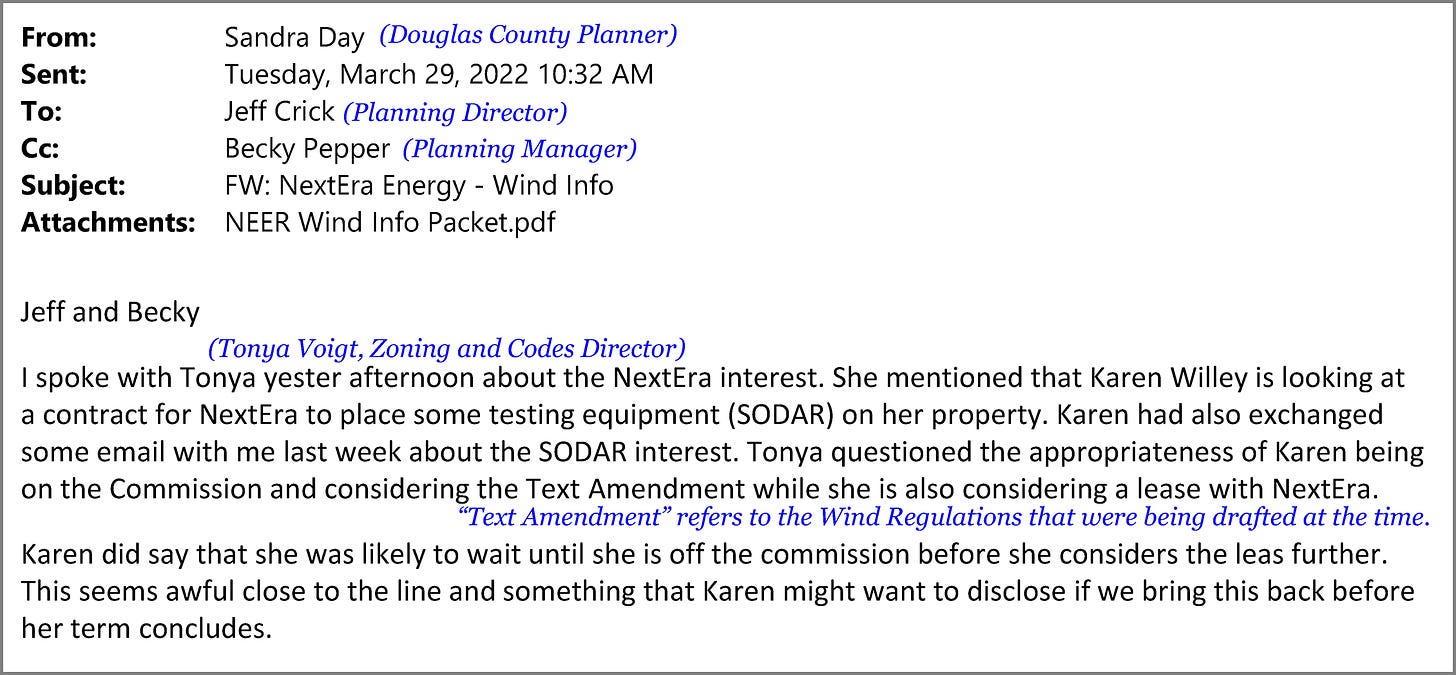
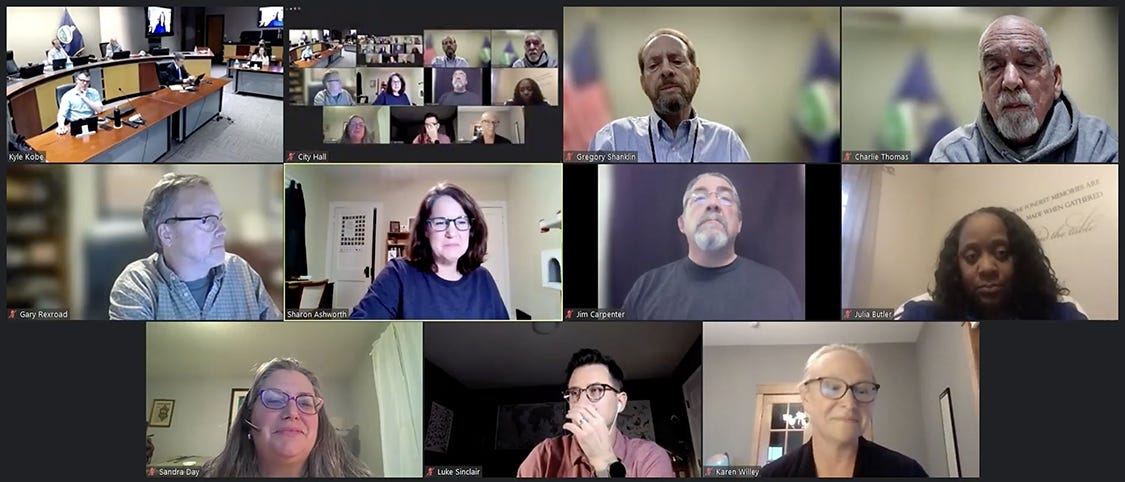
The evidence indicates numerous forms of bias:
procedural, actual, and implied
The texts and emails in the court docket create a picture of a commissioner not only overstepping ex parte standards, but demonstrating both actual and procedural bias as she:
reached out to a developer and other entities to facilitate a permit application;
networked, campaigned, and solicited support for the project;
manipulated government procedures in service of her personal objectives – mobilizing county employees and carving out opportunities for her co-worker and husband’s employer in the process.
It appears she was acting solely upon her own opinions and aspirations. And, again, all out of the public eye. Moreover, in Willey’s ex parte disclosure at the Savion/Evergy permit hearing, she glossed over most of her substantial handiwork and dealmaking.
She also exercised “implied bias” with the other energy developer that was looking at industrial-scale energy projects in Douglas County. In her two years on the BOCC, Willey has voted to approve every single one of NextEra’s permits for appurtenances such as meteorological (MET) towers, SoDAR units, and soil testing (around a dozen). Yet she routinely kibitzed and corresponded with their representatives, going out for coffee, personally inviting them to government proceedings, or emailing them to cheer about the county’s energy work session with a KU professor, who, coincidentally, had been commissioned by NextEra to do their economic studies for High Banks wind and West Gardner solar projects.
That same academic was, in fact, part of Commissioner Willey’s more covert efforts to generate community policies that would reinforce her desired outcomes. During the height of her feverish advocacy for Savion’s permit, Willey was also prompting the Lawrence Chamber of Commerce’s Economic Development Committee to form, yep, another ad hoc group, ostensibly to put together an official statement of support based on the economic benefits of industrial-scale renewable energy facilities. At the EDC ad hoc committee’s first official meeting, the professor presented a powerpoint of the material that had been commissioned by NextEra (and based on their data). And, rumor has it, she was drinking from a NextEra yeti.
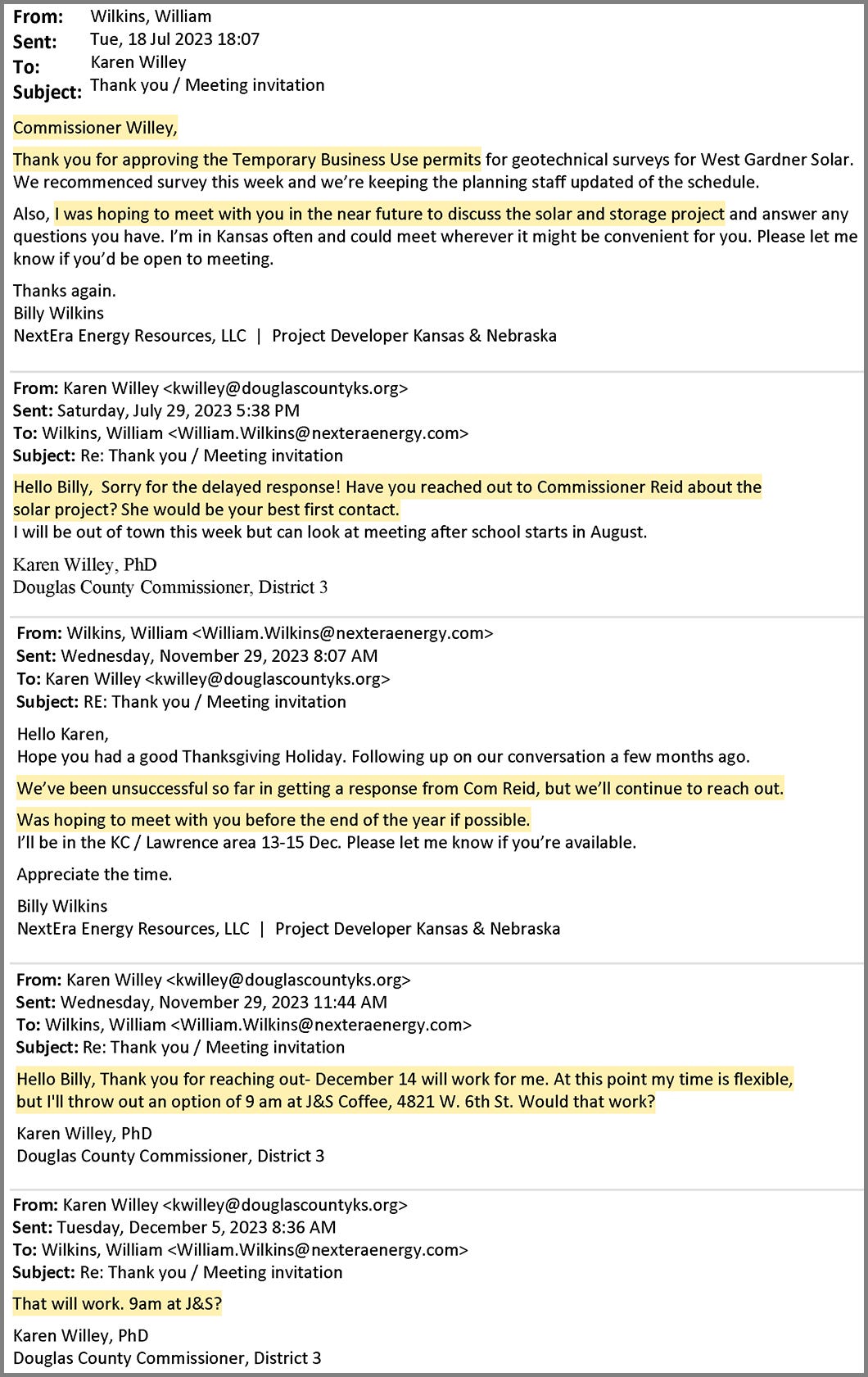
A word about violence and personal attacks
It should go without saying (yet it needs to be said), I do not endorse violence or any kind of intimidation of public officials. So far, after more than three years of attending Douglas County Planning Commission and Board of County Commissioner meetings, I have never seen any signs of threatening behavior. Although I did, over time, witness increasingly vocal opposition and frustration. (I suspect this is because the county, both officials and staff, seem to have colluded with at least one developer… while misleading the public, squelching participation, and disdainfully schlepping through the heartfelt feedback and concerns from the rural community members who would be impacted by industrial-scale renewable facilities.) I readily admit that I, as someone who has voted mostly for Democrats for nearly 50 years, was much more chagrined by the county’s chicanery than any of my right-leaning counterparts.
Commission Willey (who was not and has never been elected to office) has not demonstrated an authentic commitment to the constituents in her district. Rather, she has used her current position on the BOCC to enact her personal ideologies and denigrate the very people she purports to represent. I wish she would do better: but she’s had the chance, many times, and she hasn’t.
Unfortunately, whenever anyone questions her behavior or opposes her decisions, Commissioner Willey asserts she’s the victim of hate or personal attacks. So far, that simply hasn’t been true, unless she’s somehow conflating “personal attacks” with the fervent exasperation and dismay expressed during those three-minute public comments at the BOCC hearings. I would probably be the only person who would actually broach the subject of her character: I do indeed think Willey’s attitude and activities reveal certain traits that confirm she would be a great lobbyist but she’s a poor choice to represent the people of Douglas County’s 3rd District.




